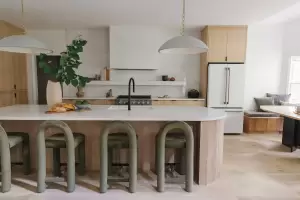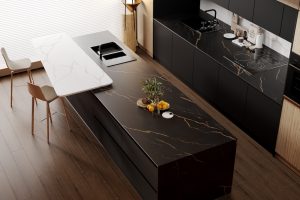Just like a blank canvas, your kitchen or bathroom awaits the perfect material – quartz vs quartzite – to bring elegance to your home. Each stone offers its own beauty and resilience, allowing you to create a sophisticated living space where function meets form.
Composition Contrast
At the very heart of their differences, quartz and quartzite are distinguished by their genesis: One is engineered, while the other is quarried pure.
Quartz is a man-made material that combines natural quartz crystals with resins, offering a wide range of customizable patterns and colors.
On the other hand, quartzite is a natural stone formed from sandstone under intense pressure and heat, resulting in unique veining and a strong character that tells stories of the past.
Quartz Essentials
Quartz countertops offer versatility, practicality, and beauty. Engineered with advanced technology, quartz combines natural elements for a “man-made authenticity”. Sealed surfaces ensure a stain-free and low-maintenance kitchen haven.

Lucciare Rhinoceros White Quartz – Subtle veining that’s nearly invisible to the eye creates movement atop this simple, bone white surface
Quartz is non-porous, making it highly resistant to staining and bacterial growth.
Every quartz slab design tells a story, one that imbues your space with a narrative of luxury.
Quartzite Basics
Quartzite is a naturally formed stone, shaped by the Earth’s pressures, known for its resilience and age. This metamorphic rock undergoes a remarkable transformation from sand to a sparkling crystalline beauty.
Quartz vs Quartzite: Aesthetic Appeals
Quartz countertops exude refined elegance with a range of colors and patterns, perfect for modern kitchens and baths. Manmade for uniformity, they offer contemporary allure.
On the other hand, quartzite displays natural veining and color variations, evoking the beauty of ancient landscapes.
Conflict or harmony? Quartz is known for its consistent appearance, while quartzite showcases a variety of unique geological compositions.
Color and Patterns
Quartz is renowned for its vast spectrum of colors, including sleek monochromes and vibrant hues, all with uniform patterning. Discover the most diverse and creative quartz design options in the market.

Lucciare Laurence Gold Quartz- unveils delicate, sinuous veins enriched with glistening gold-toned metallic inlays.
Visions of elegance begin with color. Quartz offers an expansive palette, from pristine whites to deep charcoals, interlaced with consistent, synthetic patterns.
Quartzite, by contrast, showcases the unpredictable beauty of nature with colors typically grounded in earthy tones and unique, random veining.
Embrace the unexpected with quartzite; each slab tells a unique story of the earth, with colors and patterns as diverse as nature’s artwork.
Finish Varieties
Quartz dazzles with a polished sheen.
Quartz countertops offer a wide range of options. You can choose a polished finish for a sleek and perfect look, or a honed finish for a more textured feel. Matte finishes are also available, adding a modern touch to your space.
Quartzite radiates with a natural luster.
This beautiful natural stone can be polished to a shiny finish, highlighting its organic beauty. Alternatively, a honed finish creates a smooth and inviting surface. Leathered textures are also becoming popular for a unique and textured feel.
Durability and Maintenance
Quartz is popularly known as a durable and low-maintenance engineered stone. Aside from its heat resistance, it also resists stains, scratches, and cracks. To find more about Quartz, visit our FAQs.
Quartzite, a natural stone, offers resilience similar to granite but requires regular sealing to preserve its unique veining.
Both materials promise enduring beauty with minimal maintenance. However, Quartz is the easier option to maintain, as it does not require sealing and is more resistant to stains, scratches, and cracks.
Care Requirements
Quartz demands minimal maintenance.
Quartz, a non-porous material, resists staining and does not require regular sealing. Its maintenance routine is straightforward: clean with gentle soap and water. Discover the ease of quartz care and maintenance here.
Quartzite requires sealing.
While quartzite’s beauty is undeniable, it demands a bit more love. As a natural stone, it is porous and needs sealing upon installation and periodically afterward, typically once a year, to keep stains at bay. This protective measure ensures that liquids don’t penetrate and mar the surface’s integrity.
Cost and Installation
When assessing quartz and quartzite for your surfaces, budget allocation for cost and installation is a paramount consideration.
Quartz often graces homes with its more uniform appearance at a price point that embodies both affordability and luxury. Its engineered nature simplifies installation, leading to a polished look with less complexity.
Quartzite, a gift from the earth, usually commands a higher market value due to its rarity and robustness; installation requires meticulous craftsmanship.
Price Comparison
The battle of the expense begins when weighing quartz against quartzite.
- Quartz countertops typically emerge as the cost-effective contender, boasting a lower price tag. It offers a predictable pricing structure, making budgeting straightforward.
- Quartzite countertops often carry a premium, reflecting its natural rarity and durability, making it more expensive.
- Additional costs for quartzite may include complex installation and long-term maintenance.
Installation Considerations
When choosing between quartz and quartzite, consider the weight of these materials and their impact on cabinetry and support structures.
Quartz, being a composite material, requires substantial support and professional installation.
Quartzite, being naturally heavier, may require additional reinforcement in cabinetry and floor structures. It is important to work with a knowledgeable stone fabricator who can ensure proper installation and protect surrounding areas and fixtures.
Quartz vs Quarzite Conclusion
For homeowners planning their space transformation in 2024, the choice between quartz vs quartzite should consider factors such as durability, maintenance, and aesthetic appeal to determine which is better suited for your project. Check out Lucciare’s Kitchen and Bathroom Visualizer here and witness your vision materialize.
Lucciare, being the leader in the art of marbleized veining, offers the best of all worlds, with a level of beauty and durability, stain resistance, and a non-porous microbial-free quartz. Lucciare’s quartz countertops are nature-inspired, reflecting the beauty of Earth.

